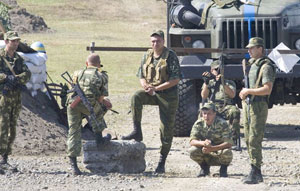(lead article)
Moscow builds bases in Georgian regions
Moves to ‘absorb’ South Ossetia

|
|
Reuters/Vasily Fedosenko
|
|
Russian soldiers stand guard at military post as nearby demonstrators protest occupation of Georgia September 1 outside the Georgian city of Poti.
|
BY CINDY JAQUITH
September 3—Moscow took another step toward reasserting its domination of Georgia with the August 29 announcement that Russia will “absorb” the region of South Ossetia, a part of Georgian territory, and establish military bases there and in Abkhazia, another Georgian region.
The move followed the Russian government’s recognition of South Ossetia and Abkhazia as “independent” states August 26. Three days later, after meetings between Russian president Dimitry Medvedev and South Ossetian president Eduard Kokoity, Kokoity announced that South Ossetia will unite with North Ossetia, which is part of Russia.
“Soon there will be no North or South Ossetia. There will be a united Alania [Ossetia] as part of Russia,” Kokoity said. “We will live in one united Russian state.”
South Ossetia and Abkhazia declared “independence” following the August 8 Russian invasion of Georgia that left Moscow’s troops occupying major portions of that country. Moscow claimed it acted to defend the rights of South Ossetians and Abkhaz from Georgian attack, but evidence continues to surface that the invasion was planned months in advance.
Ever since the breakup of the USSR in the early 1990s, when nations oppressed by the ruling bureaucracy in Moscow declared their independence, the KGB-led Russian government has sought ways to reassert its economic, political, and military power in the region. The invasion of Georgia is Moscow’s first step toward doing that.
Georgia has historically been oppressed by Great Russian chauvinism, both under the tsar and under the rule of the privileged caste headed by Joseph Stalin that carried out a counterrevolution in the mid-1920s against the gains workers, peasants, and oppressed nationalities won with the October 1917 Russian Revolution led by Vladimir Lenin.
‘Privileged influence’
On August 31 Medvedev indicated that Russian aggression will not stop at Georgia’s border. He declared that Moscow has “regions of privileged interest” and will defend “the life and dignity” of Russian citizens “no matter where they are located.” His remarks were seen as an open threat to Crimea, a province of Ukraine that is predominantly Russian, as well as Baltic states where there are also large concentrations of Russians.
Ukrainian president Viktor Yushchenko had earlier responded to the invasion of Georgia by saying he would no longer permit the Russian Black Sea Fleet to dock at the Crimean port of Sevastopol. After dissension in his government, he retreated to calling for an increase in the rent Moscow pays to lease the Sevastopol base.
On September 1 Russian foreign minister Sergei Lavrov proposed an embargo on arms sales to Georgia until its president, Mikhail Saakashvili, is forced out of office. Repeating the now discredited lie that Russia invaded Georgia to halt “genocide” against South Ossetians, Lavrov said Moscow would “continue measures to punish the guilty, so that this regime can no longer commit evil.”
The Georgian government responded by breaking diplomatic relations with Moscow. It also withdrew from a 1994 cease-fire agreement in Abkhazia that allowed the presence of Russian “peacekeepers” in that region. In the course of its invasion of Georgia last month, Russia drove all remaining Georgian troops out of Abkhazia. The Abkhaz government announced Russia would represent it in foreign affairs.
According to Reuters, Russian troops continue to occupy towns outside the city of Gori, near Georgia’s capital Tbilisi, and are not allowing residents who fled to return. Lado Vardzelshvili, governor of Gori, told Reuters that an estimated 28,000 Georgian refugees were still blocked from going home.
Thugs terrorize Georgians
In other parts of Georgia, meanwhile, Moscow-backed thugs continued to terrorize Georgian villagers under the cover of Moscow’s “peacekeepers.” The London Times reported that goons were burning down homes, looting, and beating and killing Georgian civilians in the “buffer zone” Russian troops established north of Gori. “They had no uniform—I think they were Ossetians,” Siyala Sereteli told the Times, describing the attack on her village, Irganeteye. “They took everything they wanted, even the fans. They beat up a man using sticks and a chair and then threw him in the river.”
A representative of the UN refugee agency UNHCR said that Russian checkpoints prevented anyone from entering the “buffer zone” to investigate the situation in the villages.
In western Georgia, Russian troops continued to occupy the port town of Poti and the surrounding area. Washington made a decision in late August to reroute the Coast Guard cutter Dallas, which was to have docked in Poti to deliver humanitarian aid. On August 27 the Dallas docked instead in Batumi, a port under Georgian control.
EU summit
A European Union (EU) summit September 1 condemned Moscow’s “disproportionate response” in Georgia and said a delegation would travel soon to Russia to demand Moscow withdraw its troops to the positions they held before August 7.
The Russian foreign ministry released a statement welcoming the EU decisions. “There were calls from some states to impose sanctions on Russia and freeze relations,” the statement said. “The main thing, however, is they are in the minority and the majority of EU countries have manifested a responsible approach.”
Russia supplies more than 40 percent of Europe’s gas imports and a third of its oil. Germany—Russia’s largest EU trading partner—is particularly anxious to maintain relations with Moscow. Gerhard Schroeder, predecessor of current German chancellor Angela Merkel, is codirector of a joint venture with the Russian state-owned Gazprom to build a 750-mile pipeline to carry natural gas from Russia to Germany by 2011.
| 


